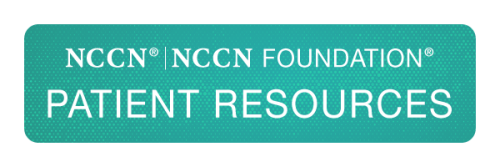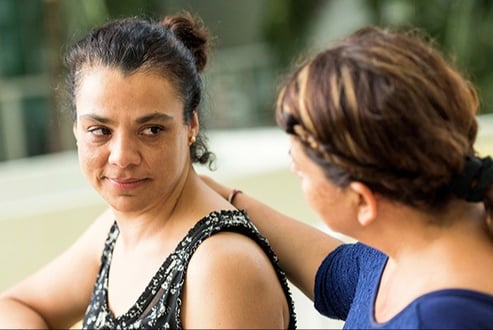Survivorship and Previvorship
Survivorship and Previvorship
Experts use the word "survivor" for any person who has been diagnosed with cancer at any . Survivorship refers to the short- and long-term health and wellness concerns of people who have been diagnosed with cancer.
A is a person with an increased risk for cancer who has not been diagnosed. The term recognizes the unique concerns of high-risk people, many of whom must make medical decisions and take steps to manage their risk for cancer.
The effects of cancer, treatment and prevention begin at diagnosis but they can last long after medical care ends.
Follow-up care after treatment or prevention
Even after a treatment or procedure ends, it is important for cancer people to receive ongoing follow-up care from a doctor who can address the issues listed below.
The National Comprehensive Cancer Network recommends that patients be checked annually by their oncologist or primary care doctor for special health issues, including:
- cardiovascular (heart) disease
- emotional distress
- (memory and thinking) issues and fatigue
- menopause symptoms
- pain
- sexual dysfunction
- sleep disorders
For many of the health issues listed above, exercising regularly, eating a balanced diet and maintaining an ideal body weight can improve health outcomes. Research on ways to improve health and quality of life in cancer survivors is ongoing.
Survivorship Care Guidelines
Survivorship care plans
Some doctors provide their patients with a "survivorship care plan" that outlines the care the patient received and provides a list of recommended follow-up visits, late-onset symptoms to watch for and recommended care. It is very important that you speak with your doctor and have a plan for long-term care, including:
- which doctors you should see, and how often.
- which tests should you have done, and when.
- what symptoms to watch for and who to report them to.
Partner Video
Triage Cancer Presents: Cancer Survivorship Care Plans
Heart disease
People diagnosed with cancer have a greater risk for heart disease than people who have never been diagnosed. Some cancer treatments, including chest radiation, and certain chemotherapy and agents can cause heart damage. Other risk factors include early-onset menopause from treatment or surgery and a family history of heart disease.
NCCN survivorship guidelines recommend that cancer survivors be regularly checked for heart disease:
- Doctors should review patients' medical history and note any treatments that increase risk for heart disease.
- Doctors should check patients for other heart disease risk factors, including high cholesterol, diabetes, smoking, obesity, early-onset menopause and a family history of heart disease.
- Doctors should examine patients for signs of heart disease.
- Patients showing evidence of heart disease should have a complete cardiac exam, including imaging (e.g., echocardiogram), EKG and blood tests.
Because heart disease that is caught early is more treatable, it's important for cancer survivors to receive follow-up care for heart disease and to report to their doctor any shortness of breath, abnormal heart rhythm, chest pains or other symptoms.
function and fatigue
People diagnosed with cancer often report trouble with their memory and abilty to think clearly, also known as cognition. This change can persist even years after treatment ends. Chemotherapy and other treatments may effect memory; patients sometimes refer to this as "chemo-brain." Other factors, like early-onset menopause, stress and anxiety may also affect memory. In many cases, memory changes associated with cancer improve over time.
Like memory issues, fatigue is common in cancer survivors and can persist years after treatment. Many of the causes and approaches to fatigue are similar to those for memory.
NCCN guidelines recommend that doctors ask cancer survivors about changes in memory and thinking and their experience and level of fatigue as part of their regular visits. Patients who report changes or fatigue should be checked and treated for underlying causes including depression, sleep disturbance and medication side effects. The guidelines recommend that survivors limit alcohol and drugs that can affect memory, sleep quality and energy level.
Some research has shown a benefit from yoga, exercise, mindfulness, meditation and training. Research has shown some benefit from the medication Modafinil, a drug used to treat sleep disorders.
is fluid buildup and swelling that develops in the arms, legs or other part of the body, usually as a result of surgery that removes or radiation therapy. The swelling and fluid may be mild to severe and can cause pain, infection and loss of mobility.
Although symptoms of may not always be obvious, it is important for people who have had surgery, radiation or removed to report any persistent feeling of heaviness, pain or discomfort, muscle weakness, tightness or swelling to their doctor.
is usually managed with special massage and compression garments. This is most effective when it is caught early. In some circumstances, that progresses can be managed with surgery. The right type of weight training under supervision and physical activity do not worsen and in fact, may help to lower risk.
Sleep
Sleep is important to overall wellness. There are many different reasons why survivors and previvors may suffer from sleep disturbances. The NCCN recommends that doctors ask patients about their quality of sleep and check for underlying medical causes of sleep disturbances. Sleep experts can help develop plans for treating sleep disorders. Treatments may include behavioral therapy, strategies for improving sleep habits, supplements and medication.
In the News
Watch our Videos
Treatment Side Effects: Cancer Survivorship
Things You Can Do to Optimize Your Sleep, Starting Tonight
Many cancer centers offer survivorship expertise and services, including fatigue clinics, sleep centers, experts, and pain management experts. Ask your doctor to refer you to experts who can address your symptoms and concerns. The following resources can help you find experts:
- The American Academy of Sleep Medicine's website SleepEducation.org includes a section on finding a sleep center by location.
- The American Physical Therapy Association's ChoosePT.com website allows you to search for a physical therapist in your area.
- Eatright.org, the website for the Academy of Nutrition and Dietetics, has an online tool to find a nutritionist in your area. You can search for nutritionists by specialty, including "cancer," "weight management" and "heart health."
- The National Certification Commission for Acupuncture and Oriental Medicine has a searchable directory of licensed acupuncturists.
- The Lymphatic Education & Resource Network has tips and tools for finding experts.
- The Menopause Society is an organization for menopause experts. Their website has a tool to help you find a qualified menopause expert in your area.
The following studies look at the management of side effects:
Multiple cancers
- NCT02296450: Quality of Life (QoL) Assessment in Cancer Patients and Survivors With Dermatologic Conditions Using Dermatologic QoL Instruments. This large study examines how skin conditions that are related to different kinds of cancer or cancer treatments affect a patient's overall well-being.
- NCT05056077: Tools to be Fit. This quality-of-life study examines the best tools for helping cancer survivors improve their diet, and exercise for people with bladder, breast, colon, endometrial, kidney (renal cell carcinoma), ovarian, or rectal cancer.
- NCT03996265: Bupropion in Reducing Cancer Related Fatigue in Cancer Survivors. This study tests how well the drug bupropion (Wellbutrin) reduces cancer-related fatigue for survivors.
Breast cancer
- NCT04586530: Telehealth and Memory Study (TAMS). This trial seeks to confirm the effectiveness of Memory and Attention Adaptation Training (TAMS), a cognitive-behavioral therapy as a treatment for chemotherapy-related dysfunction among breast cancer survivors.
- NCT02290834: Chemotherapy-induced and brain changes in older adults with breast cancer. This study investigates abilities and brain images before and after chemotherapy to identify people at risk for side effects and to better understand the effects of treatment on brain structure and function.
- NCT03879629: TrAstuzumab Cardiomyopathy Therapeutic Intervention With Carvedilol (TACTIC). Breast cancer patients receiving Herceptin or other HER2-directed therapy are at risk of heart damage. This study looks at whether beta-blocker drugs could help prevent this from happening.
Colorectal cancer
- NCT05239338: Preserving Fertility After Colorectal Cancer Study (PREFACE). This study investigates the reproductive health and clinical outcomes among individuals ages 18 to 49 who are diagnosed with colorectal cancer.
- NCT06420726: Resistance Exercise and Creatine in Colorectal Cancer. This study assesses the feasibility of combining creatine supplementation with resistance training versus resistance training alone in colorectal cancer survivors.
Ovarian cancer
- NCT05047926: Prehabilitation for Advanced Ovarian Cancer Patients. This study tests whether structured activity for women undergoing chemotherapy improves their physical state before surgery and thus improves outcomes.
cancer
- NCT03971591: Men Moving Forward: A Lifestyle Program for African-American Cancer Survivors (MMF). This study looks at Men Moving Forward (MMF), a community-based lifestyle intervention that supports adherence to nutrition and physical activity guidelines to promote improved body composition and lessen the side effects of treatment.
- NCT05155501: Pelvic Fascia spARing Radical Prostatectomy TrIAL (PARTIAL). This clinical trial studies whether pelvic fascia-sparing radical prostatectomy has similar cancer control and sexual function outcomes and significantly better urinary function, less penile deformity and inguinal hernia risks as compared to radical prostatectomy.




